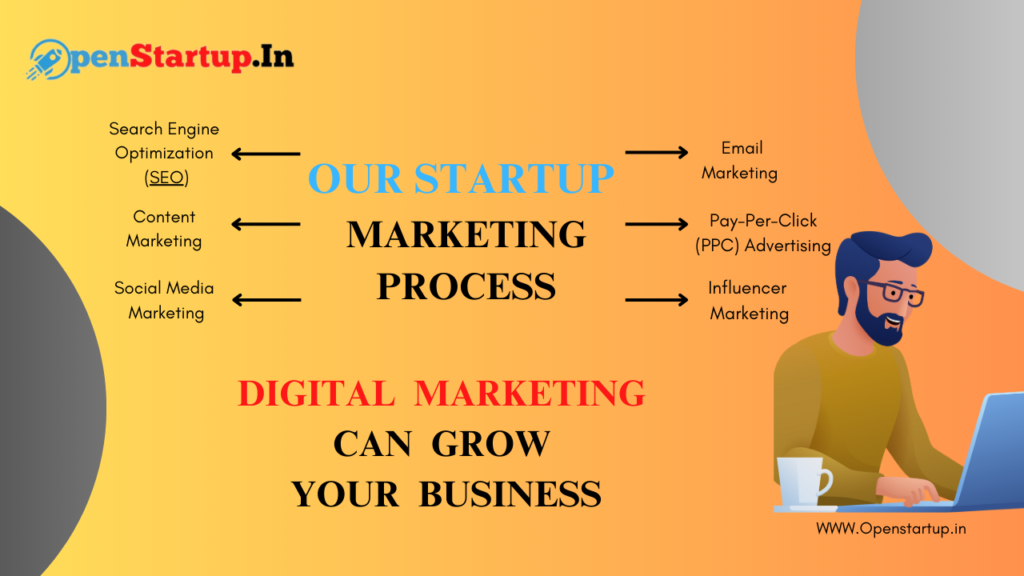In today’s fast-paced digital landscape, startups must leverage effective marketing strategies to stand out and thrive. With competition growing rapidly across various sectors, a robust Digital marketing for startups strategy is no longer optional—it’s essential. This guide delves into the most effective digital marketing strategies tailored specifically for startups, helping you navigate the digital realm and achieve your business goals.
Why Digital Marketing for Startups is crucial
Startups face unique challenges, including limited budgets and the need for rapid growth. Digital marketing for Startups offers a cost-effective solution to these challenges. Here are a few reasons why digital marketing is particularly crucial for startups:
- Cost-Effective: Unlike traditional marketing methods, digital marketing provides startups with affordable options to reach their target audience. From social media advertising to email marketing, there are various cost-effective channels available.
- Targeted Reach: Digital marketing allows startups to target specific demographics based on various factors such as age, location, interests, and behaviors. This targeted approach ensures that marketing efforts reach the most relevant audiences.
- Measurable Results: Digital marketing provides startups with real-time analytics, allowing them to measure the effectiveness of their campaigns. This data-driven approach enables businesses to make informed decisions and optimize their strategies for better results.
- Brand Visibility: Establishing a strong online presence is vital for startups. Digital marketing helps businesses increase their visibility and build brand recognition in a crowded marketplace.
- Engagement and Customer Relationships: Digital marketing fosters direct engagement with customers through social media, email, and other platforms. This engagement helps build trust and loyalty among customers, which is essential for long-term success.

Key Digital Marketing Strategies for Startups
Now that we understand the importance of digital marketing for startups, let’s explore the key strategies that can help you establish a strong online presence and drive growth.
1. Search Engine Optimization (SEO)
Search Engine Optimization (SEO) is the process of optimizing your website to rank higher in search engine results pages (SERPs). A solid SEO strategy is essential for driving organic traffic to your website. Here’s how to implement effective SEO practices:

Keyword Research
Start by identifying relevant keywords that your target audience is searching for. Use tools like Google Keyword Planner, SEMrush, or Ahrefs to discover high-volume keywords related to your business. Incorporate these keywords into your website content, including titles, headings, and body text.
On-Page Optimization
Optimize your website’s on-page elements to improve its visibility in search engines. This includes:
- Title Tags and Meta Descriptions: Ensure that each page has a unique title tag and meta description that include target keywords.
- Header Tags: Use header tags (H1, H2, H3) to structure your content. Include keywords in these headers to enhance SEO.
- Image Optimization: Optimize images by using descriptive file names and alt text. This helps search engines understand your content better.
Content Creation
Regularly publish high-quality, informative content that addresses your audience’s needs. Blog posts, articles, and guides not only improve your SEO but also position your brand as an industry authority. Aim for consistency and relevance in your content strategy.
Link Building
Build backlinks from reputable websites to improve your domain authority. Engage in guest blogging, collaborations, and outreach to acquire valuable links that enhance your SEO efforts.
2. Content Marketing
Content marketing is a powerful strategy for startups to attract and engage their target audience. It involves creating and distributing valuable content to establish your brand’s authority and connect with customers. Here are key components of an effective content marketing strategy:
Blogging
Start a blog on your website and publish informative and engaging articles related to your industry with Digital Marketing For Startups. Aim for high-quality content that addresses common pain points and provides solutions. Optimize your blog posts for SEO by including relevant keywords.
E-books and Whitepapers
For Digital Marketing for Startups Create in-depth e-books or whitepapers that provide valuable insights or solutions to industry challenges. Offer these resources in exchange for email sign-ups, allowing you to build your email list.
Videos and Visual Content
Incorporate videos, infographics, and other visual content to enhance engagement. Visuals are more likely to be shared on social media, increasing your brand’s reach.
Webinars and Online Workshops
Host webinars or online workshops to share your expertise with your audience. This interactive format allows for real-time engagement and positions your startup as a thought leader in your industry.
3. Social Media Marketing
For Digital Marketing for Startups Social media platforms provide startups with a unique opportunity to connect with their audience and build brand awareness. Here’s how to leverage social media effectively:
Choose the Right Platforms
Identify the social media platforms where your target audience is most active. For B2B startups, LinkedIn may be a key platform, while B2C businesses may find success on Instagram or TikTok.
Create Engaging Content
Develop a content strategy that includes a mix of promotional content, informative posts, and interactive content. Use eye-catching visuals, compelling captions, and relevant hashtags to boost engagement.
Paid Advertising
Consider using paid social media advertising to reach a broader audience. Platforms like Facebook and Instagram offer robust targeting options, allowing you to reach specific demographics based on interests and behaviors For Digital Marketing For Startups.
Monitor Performance
Regularly track and analyze your social media metrics, such as engagement rates, follower growth, and website traffic. Use this data to refine your strategy and optimize your content for better results.
4. Email Marketing
Email marketing is a highly effective channel for startups to nurture leads and engage with customers. Here’s how to implement a successful email marketing strategy:
Build an Email List
Use lead magnets, such as free resources or discounts, to encourage website visitors to subscribe to your email list. Ensure that your sign-up forms are easily accessible on your website.
Segment Your Audience
Segment your email list based on user behavior, demographics, and preferences. This allows you to send targeted and relevant content to different audience segments, improving engagement and conversion rates.
Personalize Your Campaigns
Personalization is key to effective email marketing. Use the recipient’s name and tailor content to their preferences and behaviors. Personalized emails are more likely to resonate with your audience.
Automate Your Campaigns
Utilize email marketing automation tools to streamline your campaigns. Set up welcome emails, follow-ups, and newsletters to keep your audience engaged over time.
Analyze Performance
Regularly monitor key email metrics, such as open rates, click-through rates, and conversion rates. Use A/B testing to optimize your subject lines, content, and calls to action.
5. Pay-Per-Click (PPC) Advertising
Pay-Per-Click (PPC) advertising allows startups to gain immediate visibility on search engines and social media platforms. Here’s how to effectively use PPC advertising:
Keyword Selection
Choose relevant keywords with high search volume and low competition. Conduct thorough research to identify the best keywords for your campaigns.
Compelling Ad Copy
Write persuasive ad copy that captures attention and encourages clicks. Highlight your unique selling points and include strong calls to action (CTAs).
Optimize Landing Pages
Ensure that your landing pages are optimized for conversions. They should load quickly, provide relevant information, and align with the ad content. Use A/B testing to determine which landing page elements drive the highest conversions.
Monitor Performance
Continuously track the performance of your PPC campaigns using analytics tools. Monitor metrics such as click-through rates, conversion rates, and return on ad spend (ROAS) to make data-driven decisions.
Adjust and Improve
Be prepared to adjust your campaigns based on performance data. Test different ad formats, copy, and targeting options to identify what works best for your audience.
6. Influencer Marketing
Influencer marketing can significantly enhance a startup’s brand visibility and credibility. Collaborating with influencers allows you to tap into their established audiences. Here’s how to leverage influencer marketing effectively:
Identify Relevant Influencers
Research influencers in your industry who align with your brand values and have an engaged following. Look for influencers who genuinely connect with their audience.
Build Relationships
Reach out to influencers with personalized messages. Engage with their content to establish a rapport before proposing a collaboration. Authentic relationships can lead to more impactful partnerships.
Collaborate on Content
Work with influencers to create authentic content that showcases your products or services. This could include sponsored posts, reviews, or social media takeovers.
Measure Impact
Track the performance of influencer campaigns using metrics such as engagement rates, website traffic, and conversions. This data will help you assess the ROI of your influencer partnerships.
7. Analytics and Continuous Improvement
The digital marketing landscape is constantly evolving, and startups must regularly assess their strategies to stay ahead of the competition. Here are some steps to ensure continuous improvement:
Utilize Analytics Tools
Use tools like Google Analytics, social media insights, and email marketing analytics to gather data on your marketing efforts. Track key performance indicators (KPIs) such as website traffic, conversion rates, and engagement metrics.
Conduct Regular Audits
Perform regular audits of your digital marketing strategies to identify areas for improvement. Assess your website’s SEO performance, social media engagement, and email campaign effectiveness.
Stay Updated on Trends
Digital marketing trends change rapidly, so it’s essential to stay informed about the latest developments in the industry. Follow industry blogs, attend webinars, and participate in online communities to stay up-to-date.
Experiment and Adapt
Don’t be afraid to experiment with new strategies and techniques. Test different approaches, analyze the results, and adapt your marketing efforts based on what works best for your audience.
Conclusion
Digital marketing for Startups is not just a tool but a lifeline for startups aiming to compete in today’s fast-paced, ever-changing marketplace. By strategically leveraging SEO, content marketing, social media, email marketing, PPC, and influencer partnerships, startups can build brand visibility, engage their target audience, and drive sustainable growth—all while staying within budget.
However, success requires more than just implementation. Digital Marketing For Startups must consistently analyze data, stay agile, and adapt their strategies to evolving trends and customer behaviors. By embracing a dynamic, data-driven approach to digital marketing, startups can overcome challenges, accelerate growth, and position themselves as leaders in their industries. Ultimately, with the right strategies in place, digital marketing empowers startups to not only survive but thrive in a highly competitive landscape.

